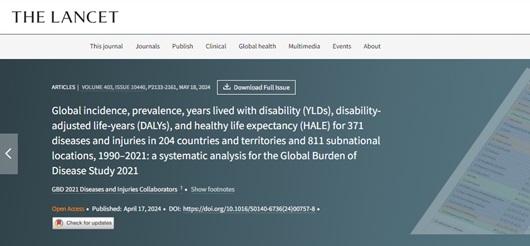International study analyzes global health loss
23/05/2024
Fiocruz Pernambuco
 The international study group Global Burden of Diseases, whose team includes Fiocruz Pernambuco researcher Rafael Moreira, has published another article in the British scientific journal The Lancet, a comprehensive survey of global health loss, based on the analysis of data from 371 diseases and injuries in 204 countries and territories. The group checked information for the period between 2010-2021 to highlight trends in the burden of disease over the last decade and during the first two years of the COVID-19 pandemic (2020 and 2021).
The international study group Global Burden of Diseases, whose team includes Fiocruz Pernambuco researcher Rafael Moreira, has published another article in the British scientific journal The Lancet, a comprehensive survey of global health loss, based on the analysis of data from 371 diseases and injuries in 204 countries and territories. The group checked information for the period between 2010-2021 to highlight trends in the burden of disease over the last decade and during the first two years of the COVID-19 pandemic (2020 and 2021).
By cross-referencing the information, it was possible to report the prevalence, incidence, years lived with disability (quantifying non-fatal loss of health), years of life lost (quantifying fatal loss of health), disability-adjusted life years (quantifying both years of life lost due to premature mortality and years lived with disability) and healthy life expectancy (quantifying the expected years of life lived in good health). The analysis includes stratification by age, gender, location and sociodemographic groups.
"At a global level, we found in this study that the burden of diseases and injuries has changed in 2021 compared to previous years, with COVID-19 imposing additional health losses as the main cause of the burden in 2021. Neonatal diseases, ischemic heart disease and stroke remain among the leading causes of DALYs [years of life lost due to premature mortality and years lived with disability] worldwide in 2021, as in all the years of the previous decade. These findings highlight the importance of continuing to prioritize policies for the prevention and treatment of non-communicable diseases, along with improvements in health systems and ongoing vaccination against COVID-19 and other transmission prevention efforts," the study points out.
According to the article, the estimates generated "will allow up-to-date identification of health disparities within and between populations, enabling to assess how these have changed over time, quantify health gains and, in turn, identify policies or interventions with the most promising opportunities for impact in the post-COVID-19 era".



